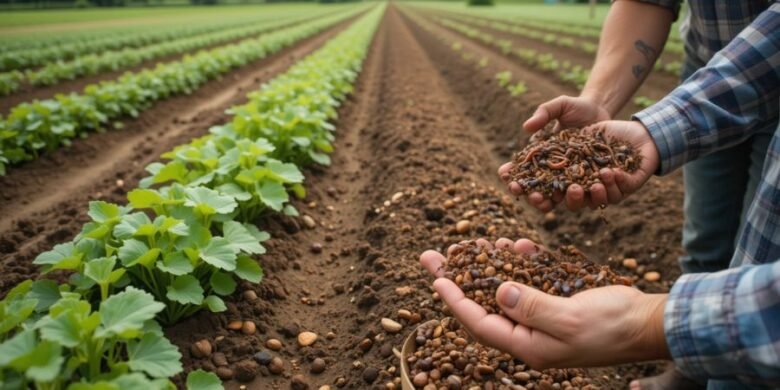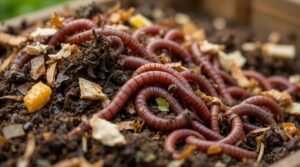Sustainable agriculture focuses on practices that preserve the environment, support soil health, and promote long-term productivity. Worms, often overlooked, play a critical role in achieving these goals. Their natural abilities to aerate soil, recycle nutrients, and enhance microbial activity make them indispensable allies for sustainable farming.
This article explores the vital contributions worms make to sustainable agriculture and highlights how integrating them into farming practices can lead to healthier soils, higher yields, and a greener planet.
Worms as Nature’s Soil Engineers
Worms are often called “ecosystem engineers” because of their ability to transform and improve soil structure.
1. Soil Aeration
As worms burrow through soil, they create channels that:
- Improve air circulation.
- Enhance water infiltration and drainage.
- Reduce soil compaction, allowing roots to grow more freely.
Impact on Sustainable Farming: Aerated soil supports better plant growth, reduces erosion, and minimizes the need for heavy machinery to break up compacted soil.
2. Nutrient Recycling
Worms consume organic material and break it down into smaller particles. Their digestive process produces worm castings, which are:
- Rich in essential nutrients like nitrogen, phosphorus, and potassium.
- Packed with beneficial microbes that aid in nutrient availability.
Impact on Sustainable Farming: Farmers can reduce reliance on synthetic fertilizers by using worm castings, which improve soil fertility naturally.
Worms and Soil Health
Healthy soil is the foundation of sustainable agriculture, and worms contribute significantly to maintaining and improving soil quality.
1. Enhancing Microbial Activity
Worms stimulate microbial populations in the soil by:
- Creating a favorable environment through their castings.
- Mixing organic matter into deeper soil layers.
Why It Matters: Microbial activity is essential for breaking down organic matter, fixing nitrogen, and suppressing plant diseases.
2. Increasing Organic Matter
Worms help incorporate organic matter into the soil:
- Leaf litter, crop residues, and manure are processed into nutrient-rich humus.
- Humus improves soil structure and increases its ability to retain water and nutrients.
Benefit for Farmers: Higher organic matter levels reduce the need for irrigation and external inputs, saving costs and resources.
Worm Farming in Sustainable Agriculture
Farmers can actively harness worms’ abilities through vermiculture and vermicomposting.
Vermiculture
The practice of raising worms for agricultural benefits:
- Live Worms: Introduced directly into fields to enhance soil aeration and structure.
- Continuous Process: Worm populations naturally grow and adapt to the farm’s environment.
Vermicomposting
The process of using worms to produce organic compost:
- Organic waste, like crop residues and food scraps, is converted into high-quality worm castings.
- Vermicompost is rich in nutrients and can be used as a natural fertilizer.
Adoption in Farming:
- Large-scale vermicomposting systems are used on farms to process organic waste efficiently.
- Farmers integrate worm farms to recycle waste and produce compost on-site.
Environmental Benefits of Worm Integration
Incorporating worms into farming practices supports broader environmental goals.
1. Reducing Chemical Dependency
- Worm castings provide a natural alternative to synthetic fertilizers.
- Healthier soil reduces the need for chemical pesticides.
2. Managing Organic Waste
- Worms help recycle organic waste into valuable compost.
- Diverting waste from landfills reduces methane emissions, contributing to climate change mitigation.
3. Supporting Biodiversity
- Worm activity promotes diverse microbial and insect populations in the soil.
- A balanced ecosystem leads to more resilient farming systems.
Real-World Examples of Worms in Sustainable Agriculture
1. Vermicomposting in Organic Farms
Organic farms often use vermicomposting systems to manage waste and enrich soil without synthetic inputs. For example:
- A farm in California diverts tons of organic waste annually to produce vermicompost, improving yields while maintaining organic certification.
2. Agroecology Practices in India
Small-scale farmers in India integrate worms into their fields to enhance soil fertility naturally. The practice has reduced costs and improved crop productivity in resource-limited settings.
Practical Tips for Farmers
- Start a Vermicomposting System:
- Use organic waste like crop residues or kitchen scraps.
- Maintain proper moisture and temperature to ensure worm health.
- Introduce Worms to Fields:
- Apply worms directly to soil in high-compaction areas.
- Pair with cover cropping or mulching to maximize benefits.
- Educate and Scale:
- Participate in workshops to learn vermiculture techniques.
- Scale up worm farming systems as demand for compost grows.
Conclusion
Worms are unsung heroes in sustainable agriculture, offering solutions to some of the most pressing challenges farmers face today. Their ability to aerate soil, recycle nutrients, and enhance microbial activity makes them a cornerstone of regenerative farming practices. By integrating worms into agricultural systems, farmers can reduce chemical dependency, improve soil health, and contribute to a more sustainable and productive future. Let’s embrace the power of worms and work toward greener, healthier farming.




